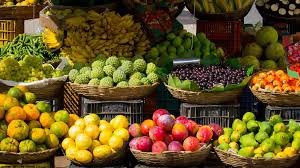Nutrition
Benefits of millet

– High nutritional value: Millets are a rich source of nutrients, including protein, fibre, and micronutrients like magnesium, potassium, and zinc.
It also has a low glycemic index. This makes it an ideal food for people with diabetes or anyone looking to maintain stable blood sugar levels.
– Gluten free: Millet is naturally gluten-free, making it an excellent choice for those with celiac disease or gluten intolerance. It’s also a great alternative to wheat for people looking to reduce their gluten intake.
-Promotes digestive health – The high fibre content in millet makes it an excellent food for promoting digestive health. It can help to prevent constipation and reduce the risk of colon cancer.
-Aids weight loss – Millets have a low calorie count, and they are an excellent food product for weight loss. They help to maintain energy levels throughout the day, preventing the need for constant snacking and overeating. Millets also keep you satiated for longer than other carbohydrates, as they take time to get digested and absorbed into your body.
-Keeps blood sugar levels low – Millets have a low glycaemic index, which makes them an excellent food for regulating blood sugar levels. Consuming millets regularly can lower your risk of developing diabetes.
-Boosts Immunity – Millets provide a great source of protein and can help develop and strengthen your immunity. A stronger immune system means fewer chances of you catching diseases.
-Reduces cardiovascular risks – The essential fats found in millets provide our bodies with good fats which prevent excess fat storage, effectively lowering the risk of high cholesterol, strokes, and other heart complaints. The potassium content in millets regulates your blood pressure and optimises your circulatory system.
-Prevents asthma – The magnesium content in millets can reduce the frequency and severity of migraines and asthma complaints. Unlike wheat, they do not contain the allergens that lead to asthma and wheezing.
-Helps your digestion – Millets are a rich fibre source that benefits digestion by alleviating bloating, gas, cramping, and constipation. Good digestion keeps issues like gastric/colon cancer and kidney/liver complaints away.
-Acts as an antioxidant – Millets help the body detox because of their antioxidant properties. Quercetin, curcumin, ellagic acid, and other valuable catechins flush out toxins from your body and neutralise the enzymatic actions of your organs.
Source: wafflemill.com
Nutrition
The First 1,000 Days: Why Ghana’s investment in maternal and child nutrition matters for human capital development

From the start of pregnancy to a child’s second birthday, the first 1,000 days, represents the most important window for human development. Good nutrition shapes the foundation.
During this short window, the body and brain grow at a pace that will never be repeated. When nutrition is inadequate, the damage to physical growth and cognitive development is often permanent. No later investment in education or healthcare can fully reverse these losses. Ghana’s future workforce and economic progress depend on getting nutrition right during this critical period.
Science is clear. A baby’s brain develops rapidly during pregnancy and early childhood, forming the foundation for all future learning and health. Adequate nutrients during pregnancy support the formation of neural connections that underpin learning, memory, and emotional regulation. When pregnant women lack essential nutrients, their babies begin life at a disadvantage. When young children experience severe malnutrition, they miss critical growth periods that do not return.
Ghana faces serious challenges during this critical window. An estimated 68,517 children suffer from severe acute malnutrition. Between 37 and 63 percent of pregnant women are anemic, with iron deficiency particularly common in late pregnancy. These problems translate directly into diminished potential. Malnourished children perform worse in school, earn less as adults, and face higher risks of chronic diseases. The economic losses multiply across generations.
Research worldwide shows that nutrition investments during the first 1,000 days deliver exceptional returns. Well-nourished children learn better, perform better academically, and become more productive adults. Countries that invest in early nutrition experience faster economic growth through stronger, more productive workforces.
Ghana already has effective solutions. Multiple Micronutrient Supplements for pregnant women reduce the risk of low birth weight and preterm birth, while Ready-to-Use Therapeutic Food enables high recovery rates for children with severe acute malnutrition. Both are approved in Ghana’s health guidelines. The problem is not lack of knowledge but lack of access. Coverage remains limited because financing depends heavily on donor support rather than sustainable domestic systems.
Integrating these nutrition interventions into the National Health Insurance Scheme would help close this gap. With a large proportion of mothers and young children already enrolled, NHIS provides a platform for nationwide reach. Recent reforms to health financing further strengthen the case for prioritising essential nutrition services within the scheme.
Ghana’s development agenda emphasizes industrialisation, innovation, and economic transformation. Achieving these goals requires a workforce capable of learning, problem-solving, and sustained productivity. Human capital development, however, does not begin at universities or training centers. It begins before birth.
The first 1,000 days offer no second chances. Each year of delay means another group of children enter adulthood carrying preventable disadvantages. Investing in nutrition during this critical window is not only a health priority; it is a foundational investment in Ghana’s economic future.
Feature article by Womec, Media and Change under its Nourish Ghana: Advocating for Increased Leadership to Combat Malnutrition project
Join our WhatsApp Channel now!
https://whatsapp.com/channel/0029VbBElzjInlqHhl1aTU27

Nutrition
Importance of Fruits During Ramadan

Ramadan, the ninth month of the Islamic lunar (Hijri) calendar, is a period of fasting, reflection, and spiritual growth. A vital part of observing Ramadan is Iftar—the evening meal with which Muslims break their daily fast at sunset. Fruits play an essential role in Iftar, providing nutrition, hydration, and energy after long hours of fasting.
Here are some of the most recommended fruits to include in your Ramadan meals:
Dates
Dates are traditionally used to break the fast. They are rich in sugar, fibre, potassium, vitamins, and minerals, helping to restore energy quickly after fasting.
Watermelon
Watermelon is highly consumed for hydration, as it is composed mostly of water. It can be enjoyed in slices or blended into refreshing smoothies.
Bananas
Bananas are an excellent source of potassium, which helps maintain fluid balance and reduce thirst. They also provide natural energy to keep you going after fasting.
Apples
Apples are fibre-rich and nutritious, promoting heart health, aiding weight management, and improving digestion.
Cucumber
Cucumber is one of the best hydrating fruits, composed of water and fibre, which aids digestion while revitalising the body.
Pawpaw (Papaya)
Pawpaw is low in calories and sugar, rich in fibre, and promotes healthy digestion, hair, and skin. It is a nutritious addition to any Iftar meal.
Including a variety of these fruits during Ramadan not only helps replenish lost nutrients but also supports overall health, digestion, and hydration throughout the fasting period.
By Linda Abrefi Wadie
Join our WhatsApp Channel now!
https://whatsapp.com/channel/0029VbBElzjInlqHhl1aTU27


 News1 week ago
News1 week agoFinance Minister outlines new gold policies to boost reserves and curb smuggling

 News1 week ago
News1 week agoSam George launches the 2026 Meteorological Awareness Month; presents the 2026 seasonal forecast for southern Ghana

 Hot!1 week ago
Hot!1 week agoBreaking: Footballer who killed two children in Abesim handed lifetime sentence






